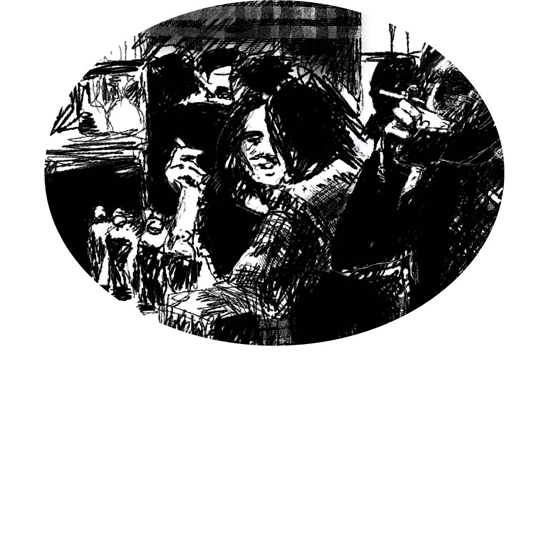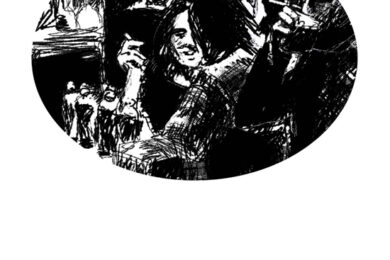Last night, 20,000 tennis fans pouring out of the 02 Arena just as I was leaving a Fall gig at the same venue nearly stopped me making it for a last pint at the Pembury Tavern, one of the finest boozers in all England. The Pembury is a vast, brightly lit room situated on a street corner in Hackney Downs which has no music or telly, but a great atmosphere fuelled by their phenomenal range of excellent ales and home-made pork scratchings. It’s the sort of pub that always beckons you off the bus home for one last pint, and I am quite sure is entirely responsible for at least half a stone of my person. The Pembury Tavern is one of the starring hostelries in Robin Turner and Paul Moody’s new book, Looking For The Moon Under Water – The Search For The Perfect Pub. Taking George Orwell’s essay about his idea of what makes a great watering hole as a starting off point, Turner and Moody embark on a thirsty exploration of the issues facing British pubs, which are currently closing at an alarming rate. In their stead come shooter-stocked vomit shops and establishments thundering with telly and fruit machines as the big pub companies go for the lowest common denominator. As well as being packed full of facts and figures and testimony from publicans, drinkers, heavy metal morris dancers and musicians including Elbow’s Guy Garvey, Turner and Moody write with a personality and intelligence that gives the book the feel of an informed, passionate chat down the pub. The more fact-based chapters are interspersed with ‘Interludes’ detailing missions to various interesting, far-flung watering holes, and its one of these that we reprint for you below. Mine’s a Black Sheep Rigwelter, ta.
Interlude: On The Road Again, by Robin Turner
It is bitingly cold and black as Hell out there on the road to nowhere and the driver is rapidly losing his patience. We’re trying to find the 54th pub on the list we’ve drawn up and it’s very clear that we’re lost. From the back seat of a well-worn Saab – air toxic and sliceable with Marlboro (Red) smoke – I am trying to guide us to a tiny hamlet in the West Midlands. Although I’m certain it exists, the scribbled-down directions I’m trying to read by the dim light of a mobile phone aren’t filling anyone with any confidence. From the front, regular strangled screams emanate. ‘I can’t do this any more!’ There is a very real chance that someone will actually, physically explode before too long if we don’t find our destination, like an outtake from Scanners. We are in search of The Yew Tree – a Victorian theme pub that doesn’t seem to have made it onto any 21st-century map. We have absolutely no fucking idea where we are.
With hindsight, maybe our initial plan was too ambitious. Sat in a central London boozer in December 2007, we decided to search the country for the perfect pub. Armed with some crumpled print-outs from Google Maps and a seemingly never-ending flow of vandal-strength lager, we drew up a list that zigzagged from coast to coast and back again. Four pints in and the idea of covering Middle England in two days made total sense.
We set out from London early having blagged a lift northwards. Styrofoam cups of instant coffee that had seemingly been heated by nuclear fission were clasped in frostbitten hands, unread copies of the Guardian lodged frozen under armpits. It was the kind of January midweek morning where the air seemed to hang opaquely just around eye level – not quite clear, not quite fog. Without much of a plan other than to see what the lay of the land was, we hit the A1 north.
Speeding through county after county, we stop for a pint or two at various key points on the way. The soundtrack is an ear-splitting mix of shit-kicker country, doomy crunking hip hop and the kind of heavy metal that leaves the speakers like a thinly veiled threat – pretty much the usual nerve-rattling Friday night blokes-only/ after-the-pub selection.
There are ludicrously high expectations for the first stop-off point. Ye Olde Trip To Jerusalem in Nottingham claims to be the oldest pub in the country. Signage inside dates it back to 1189 although the bit you drink in is only a few hundred years old. As with those establishments purporting to be the smallest pub in Britain, there are many claimants to the title of oldest pub. And, as with the smallest pubs, more often than not the title just acts as a way of ensnaring tourists and disguising what would otherwise be a pretty boring old boozer. Ye Olde Trip is… okay. Average really. Their own beer is drinkable but nothing I’d cross town for, let alone county boundaries. Maybe the excitement of a road trip – a stags-only working alco-holiday away from London – meant that Ye Olde Trip was only ever going to be a disappointment. Glasses emptied, we are back heading north.
The early warning signs that something is wrong probably come somewhere around Derby. While Paul and I can imbibe lunchtime pints, our designated driver has to survive on nothing more stimulating that energy drinks, soup-like coffee and high tar cigarettes. While we feel the glorious rosy afterburn of alcohol, he simply starts to twitch.
Hindsight is a fantastic thing, but looking back, SatNav would have really helped. It is dark outside and foggy inside, the air less a soup and more a lumpy stew. None of us have any idea where Cauldon Waterhouses – the hamlet The Yew Tree sits in – is. From our pub perch back in London, it looked so simple. Now we might as well have been trying to navigate our way to Mars. The driving seat is screaming, Paul and I are screaming back. It feels like we’ve come a long, long way from the relative sanity of that central London bar. It feels like we’ll be found by farmers in a ditch a week or so later, frozen and asphyxiated, the sounds of Slayer and the RZA weakly parping out of busted speakers. Just as things reach insanity pitch, the point where everyone is screaming, angry, confused and scared – just that tipping point at which hindsight tells you must be the very peak of madness – something looms out of the pitch-black freezing fog. A pub. An old pub. A pub called The Yew Tree.
The welcome inside isn’t exactly what you’d call warm, but to us it feels like the enveloping embrace of a long-lost relative. The pub is magical – Santa’s grotto, if Santa was dead set on making sure that all kids, naughty or nice, were going to receive Victorian ephemera for Christmas whether they liked it or not, for the rest of eternity. The bar is adorned with the classic Carling ice-cube tap covers, dismissed to landfill by pubs the country over in the mid-80s. By that point the nation’s favourite noxious tipple might as well have been Brewer’s Gold served in a gold tankard topped with flecks of gold leaf. We’d made it – literally tap water would have blown our minds wide apart at that point.
Behind the bar, there are loose packets of cigarettes on sale. A player piano in the corner has everything from Coronation anthems to ‘Bohemian Rhapsody’ (who knew that Queen were big in the world of Victoriana?). Food is strictly of the Smith’s crisps variety. One of Queen Victoria’s stockings takes pride of place in a glass cabinet. The Yew Tree is a memorial to a time gone by – that time being BBC1 in the 70s, with The Good Old Days being broadcast on an unbreakable loop. All that is missing is Leonard Sachs and a thigh-slapping version of ‘Down at the Old Bull and Bush’. It is bloody brilliant.
Landlord – and curator – Alan pours us pints of foaming nut-brown Bass from perfectly preserved antique fonts with a bemused look on his face. He’s seen it all before, the press cuttings in his scrapbooks showed us that. After decompressing, Paul and I mingle with a group of bemused locals – each disappointingly displaying the trappings of the 21st century. Dave, the group’s designated driver from nearby Winkhill, tells us of how local resident Roy Wood once played the hits of Wizzard on the in-house serpent (The Yew Tree doesn’t double as the local reptile house – it was a bass wind instrument). ‘I’m more of a Verdi man myself, but hearing ‘I Wish It Could Be Christmas Everyday’ played on that thing after six pints of bitter really takes some beating!’
Back at the bar, when asked to pose for photos, Alan promptly leaves his place behind the taps and dons a dicky bow for the pictures. It is symbolic of his brilliant eccentricity – the whole place is built around his unique vision, his unwaning enthusiasm in the face of the kind of market forces that exist to put people like him out of business. He has stood behind that same bar for 46 years, adding to his permanent collection piece by piece. Anywhere else, this may well have felt forced. Here in Cauldon Waterhouses – roughly two miles past the turnoff for the back of beyond – it somehow makes a kind of berserk sense. Alan’s obsession has morphed a backwater pub into a museum display you could get pissed in. I am sure that somewhere out of view are the pewter tankards and liver-sausage sandwiches. Orwell’s words echo from the bricks and mortar. The pub is ‘uncompromisingly Victorian… everything has the solid, comfortable ugliness of the nineteenth century’ and it certainly provides ‘what people call its “atmosphere” ‘ in spades.
In fact, there is just one problem. Emptying pint pots and asking for the next set of directions, we are told we are 20 or so miles away from our B&B in Newcastle-under-Lyme. The only way out is the way we came in.
Enter the Saab. Cue Reign In Blood.
The Moon Under Water – In Search Of The Perfect Pub is out now on Orion Books. You can buy it from the Caught By The River bookshop here.



